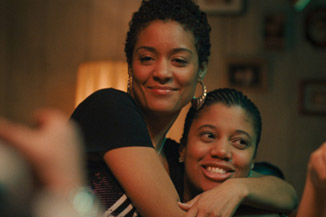BOP Interview: Dee Rees
By Ryan Mazie
January 19, 2012
Hitting theaters December 28th (it will expand outside of NY/LA in the new year) just in time to qualify for the awards circuit, the independent drama Pariah focuses on a 17-year-old Brooklyn teen (Adepero Oduye) who struggles with defining her sexuality and fitting into social norms. At a brisk 86-minutes (Pariah was first a film festival-winning short with Oduye in the same role), writer-director Dee Rees’ no-holds barred tale of facing adversity still packs an emotional wallop.
“We are trying to use the film as an outreach and get it in an academic setting,” said Rees in a roundtable interview in Boston with star Oduye, making promotional rounds for the film, “The responses were really positive [with LGBT community] saying ‘this is me.’” Rees followed by pointing out that the themes of feeling like an outcast go beyond sexuality, “A straight white guy walked up to me at Sundance and said, ‘I’m not gay,’ and I’m like, alright, I’ll get security (laughs). But he said he loved it. It transcends race and sexuality. It’s about identity.”
Adepero, I read that you came dressed to the audition as the character. So once cast, how did you further prepare yourself for feeling your part?
AO: Yes, so when I read the script I immediately related it to that feeling of not feeling free. … Dee made herself available, saying, "Any questions you have, I’m here. Ask." So reading the script, I would email her and we would have these long conversations on email, which was very nice of her to do that (laughs). She recommended a few books … and would have these assignments for us. She told me and [co-star Pernell Walker] to go to a Black and Latino lesbian club in character to get fully immersed in this world. So stuff like that added to the specifics. We went into a straight environment in character, to Dave and Buster’s in Times Square, so it was a lot of cool things like that, which made the world and characters and their relationships more specific. It wasn’t just rehearsing only the lines.
DR: As a director, I’m more interested in having actors understand why they are saying what they are saying as opposed to what they are saying. So creating these shared experiences and making sure the characters have relationships are more important than the lines themselves, because once they have a feel for the character, the rest will come through in the delivery.
What was it like playing the character again some five years later? Did you have any revelations on how to change your performance with more experience or that you are now in a larger world of characters?
AO: From short to feature was a little over three years, so when I did the short, it was this new thing I had never experienced before and had no expectations, but it did pretty well going onto Sundance. So people had this frame of reference now; a performance they can go to. So I was very nervous of not wanting to mess it up. "What more can I bring?" I didn’t want to repeat or copy what I did with certain scenes. Doing a feature, I was like, "God, there is a lot of me in this character." I wrote this long email to Dee, putting it all out, and she was very good [at encouraging me]. So I immediately calmed down. As a person and actor, in three years, I felt more grounded in terms of my approach to the craft and characters.
Continued:
1
2
3
|
|
|
|




